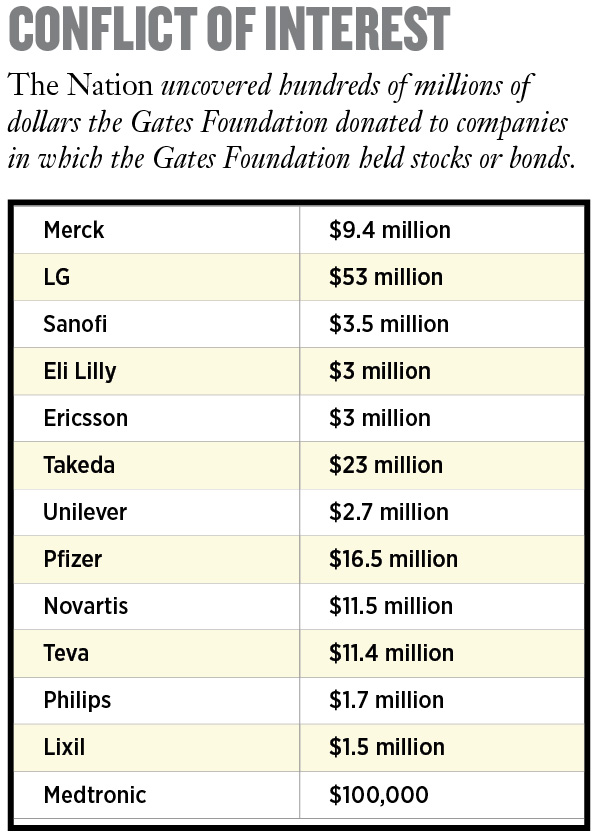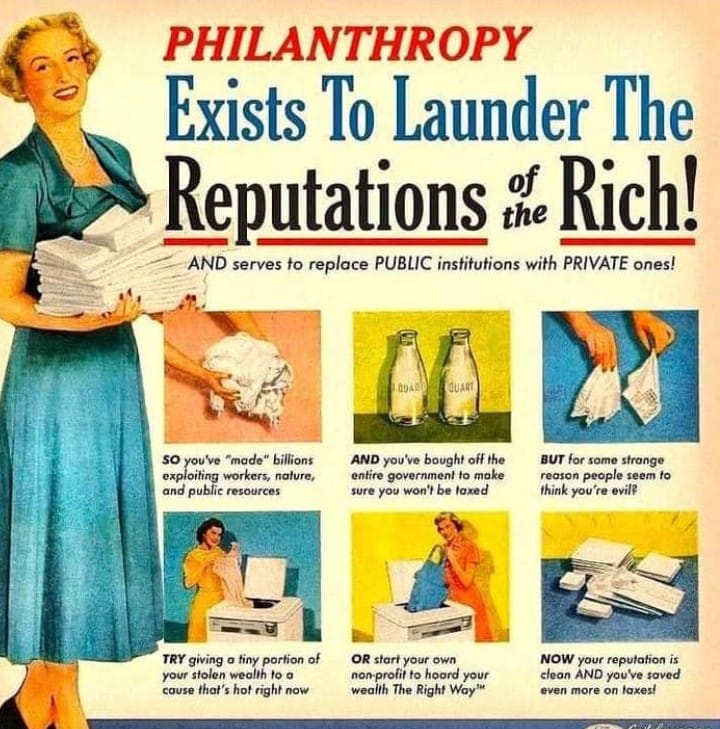This guy really proves that there are no good billionaires thing. Being good stopped him from staying a billionaire. Anyone who hoards wealth while others suffer from impoverishment and starvation is evil.
Yep. Those billions are made on the backs of suppressed wages and benefits, more employee productivity with less flexibility, enshittification, etc. It’s “earned” by squeezing it out of others.
I guess he understood that, felt guilty, and wanted to give it “back” to clear his conscience. That’s my personal take. I really want to believe there are good people with power and/or money.
That’s why its the system that needs to be killed, not billionaires. It doesn’t matter if you are good or bad, capitalism is in part a system of forced competition. A CEO who doesn’t make the hard calls for the benefit of stockholders will be replaced if he is caught choosing his moral compunctions over profits. A competitor will exploit what he might refuse to, and thus the harm is done and the “good CEO” is drummed out of the system. The only way for a CEO to remain good and a CEO is to never be tested by the markets mad search for profits. This is possible in a small way, like maybe a CEO of a small regional firm which will eventually be bought out or forced out of business. Hell, most of the strictly “moral” repercussions of an executive are hidden from them, and appear only as columns in a profit/loss report. Capitalism alienates us all from the world we inhabit, our humanity and our selves; worker and owner alike.
But regardless of this, the class interests of ceos and employees are in direct conflict. This doesn’t mean we need to kill, but we will have to fight to crush their way of life which exists as a result of the mass exploitation and immiseration of millions.
Fully agree.
Ok… but then we are beholden to where they choose to dispense their largesse. Great, the billionaires have a few pet projects they direct their philanthropy to, and it does help those recipients specifically.
But how about the lifetime earnings of the employees who saw their benefits packages shrink, their medical copays and premiums climb? Maybe that was enough to force their kids into crippling college loans instead of the parents having enough extra to help wirh 529s or just smaller more manageable loans? How about the customers who got inferior products or services that support, returns, or exchanges were obfuscated by deliberately ineffective phone menus or website resources that were designed to make people give up instead of receiving what they deserve? How about the billonaire’s pursuit of anti-tax laws to further line their pockets at the expense of government services? All of these things happen directly by command of the wealthy or by those riding on the coattails of those decisions as major investors or board of directors. All of them in service to the bottom line, and that bottom line is increased at your and my expense.
They may be good people. But you do not become a billionaire with clean hands.
I’m going to admit to being too tired to read that big middle paragraph, but that last short quip I support fully. I suppose that’s all I was trying to say. Even good people succumb to greed sometimes. For some it’s a disease. Kind of like what gambling does to the brain, but with success instead of loss. And I support someone who 1) has a conscience, and 2) actively tries to clear it. ❤️
But I don’t try to neglect those who have been negatively impacted along the way. That’s definitely a valid point. And an important point.
Money is power. Power corrupts. No exceptions. They get into the situation because they can no longer identify and understand their fellow man. There are no good billionaires. There aren’t any any good millionaires. And we should all do them a favor. And never allow them to achieve that status of hoarding.
That’s probably the unfortunate truth, yes.
co-founder of Duty Free Shoppers Group, the travel retailer of luxury products based in Hong Kong
Sort of squeezing second-hand. But you have to know his primary client pool is the business elites passing through international airports and taking advantage of a legalized form of tax evasion while exploiting the working class in sweat-shops on the mainland/surrounding Pacific islands.
A bit like becoming a billionaire by selling yachts or luxury hotels or cocaine. Even if you can argue you didn’t abuse your staff to make your mint (spoilers: you absolutely did), you know all your biggest customers did.
Technically, you’d have to declare what you are importing into the country where you live and pay tax at customs on import. It is kinda logical you dont pay VAT as a visitor since you dont live there and wouldnt benefit from the taxes you paid. Going further, I remember tax exempt cards in the 80’s you could use and show your id in stores and not pay VAT. Online versions of this exist today, I buy something from the UK and ship it to EU, I can request they not charge VAT as Im going to pay it on import.
This is a great take
There are different ways to accumulate wealth.
In an example from my country, Sir Peter Beck, is only a billionaire because the stock value of RocketLab has rocketed up (pun intended). His total compensation for the 2023 year was just under $1M. Source
I would rather that he concentrate his efforts to making the best rocket possible; he could in theory split his time and work to reduce poverty…but I believe that the rocket building would suffer.
There are a lot of other people working to reduce poverty.
I agree with your point that in general, most billionaires are shitty people who could do a lot more. But some people are billionaires because they are doing cool shit.
Will Sir Peter become a cunt in the future, who knows. In 10 years will we look back and see the decline to Musk levels of cuntishness?
Listen all I’m saying is if this Peter beck or anyone else holds on to a whole billion dollars for themselves then they lack empathy for the rest of humanity and are therefore evil. If he accidentally made a billion that’s fine but donate it.
Agreed, if you have a billion in cash sitting around, then do something with it.
But in this specific example, and really any example where someone gains their wealth from “doing stuff”. It is not liquid, sitting around in cash to hand out. It is usually in stock of the company they found.
While they are “young” and energetic making the world a better place, then keep on doing what you are doing. Once you “retire” from that then it is the time to donate.
I just responded the same idea to someone else so I apologize if I get confused between the two. But if I’m understanding you correctly, what you’re saying is this man has a billion dollars in assets but he needs them to do his work which is beneficial for people. This work is in rockets.
I’d submit to you that he doesn’t need to privately own a billion dollars worth of assets for this. People need a lot of equipment for their jobs, but these things can be owned in common, whether that’s through a co-op or through state ownership. Collectivizing the means of production is the ethical way to go. Everyone should have an equal claim to their workplace and an equal say in what goes on there.
The way we let people privately own companies now is more akin to monarchy than the democracy we think of as the bare minimum everywhere else. The workplace should be democracized.
The communism / capitalism debate is an interesting one. Each system has its advantages, and I am a strong believer in a strong compromise between the two extremes.
I don’t think that workplaces should be collectivized as a default. I also think that strong regulation and “big” government is a positive thing. The government should set the rules, for the benefit of all, but the game should be open to all players.
I am also a very strong believer that there are some activities that are far too important to leave up to the market.
- Health care
- Education
- Infrastructure
- Water
- Waste
- Roading
- Public transport
- Communications
- Social welfare
For everything else, let the market decide. Collective ownership of cafes and hardware stores isn’t really something that needs to happen. But I would also be happy if a collectively owned cafe opened up nearby, I would give them the same weight as all other cafes (how good is your coffee).
I feel you and I would agree on most issues. I would urge you to be skeptical of capitalism and the profit incentive and how it can cause harm even small ventures like cafes.
To me, the ultimate problem that capitalism and the wealth concentration that it allows presents is the ability of the individuals with this concentrated wealth to use it either legally or illegally to bend the state to their will. In the states we are all too familiar with this with lobbying. Once this happens, democracy is undermined and oligarchy begins in my opinion.
Looking from the outside, what the US has lacked is the “strong regulation” part.
In my opinion the US is way too far on the capitalist side of the slider, you are not at “pure capitalism” yet. But sometimes it doesn’t seem like you have far to go.
Private prisons are just a ridiculous, over reach of profit making into what is at its core a social problem that requires social solutions.
if I’m understanding you correctly, what you’re saying is this man has a billion dollars in assets but he needs them to do his work which is beneficial for people.
I’m not sure this is really the correct description of the situation. I’m not trying to be pedantic, but the fact that his company is valued at 1 billion doesn’t mean the assets are worth 1 billion.
People have assigned this value to the company based on assets, yes, and on the workforce and etc. But they are also assigning value to the company based on what direction they think the company will be lead. Ask yourself this - if their CEO is a genius who has proven time and again that he can make magic happen with very little worth of value, wouldn’t you invest in him? Wouldn’t you say his company, while maybe poor and shit today, will probably be worth a billion dollars soon thanks to its leadership?
Two issues come from this, both that I don’t think you account for - because you argue for workers owning the company in a co-op-like situation, or the CEO selling assets the company doesn’t need in order to put that billion to good use:
-
If the CEO starts dumping stock - so will everyone else. Selling stock means you don’t think the company is that valuable. If you don’t trust it, why should I? The company’s price would tank, and so would any potential it has
-
If workers are the decision makers, not the genius CEO that everyone trusts to lead - guess how much I’m investing in a company ran by faceless dudes that I don’t trust. Exactly $0. You make this company a co-op and you guarantee the main attraction about it is no longer attractive. And at that point if I’m the CEO I’m out anyway - you obviously don’t trust my leadership enough to let me run the company, why would I ever want to stay? But good luck competing against the face of rockets with your cute little co-op that gets no funding and can’t pay it’s employees.
My point is - you want to reap the benefits of capitalism and investments in the stock market, while living in a socialist utopia where your actions on the market don’t have consequences. I’m not sure that’ll work.
-
It doesn’t sound like he can do that without giving up his ownership stake in his company. Or is that what you are suggesting?
Oh I see what you’re saying. Yes his company should be collectivized whether that’s by making it into a co-op or through state ownership doesn’t really matter. But the people that work for him should have an equal stake in the ownership of their workplace and a say in what goes on there.
In Northern Ireland he supported “mixed” (i.e., Catholic and Protestant) child education. In 1991, he gave £8m to the Integrated Education Fund,[20] a grant-making charitable body which aims “to make integration, not separation, the norm in our education system”.[21] Queens University Belfast also received grants of more than £100m,[20] for capital projects, child education and medical research.[22]
More controversially, Feeney gave substantial personal donations to Sinn Féin, a left-wing Irish nationalist party that has been historically associated with the IRA.[14] Following the IRA ceasefire in 1994, he funded the party’s office in Washington D.C.[20]
Feeney supported the modernization of public-health structures in Vietnam,[18] AIDS clinics in South Africa, Operation Smile’s free surgeries for children with cleft lips and palates, earthquake relief in Haiti, and the UCSF Medical Center at the University of California at San Francisco.[8]
Jim Dwyer wrote in The New York Times that none of the one thousand buildings on five continents that were built with Feeney’s gifts of $2.7 billion bear his name.[1]
On September 14, 2020, Feeney closed down the Atlantic Philanthropies after the non-profit accomplished its mission of giving away all of its money by 2020.[25]
Immensely based
We found him
The good billionaire
Millionaire*
Thanks Elon
Yeah supporting IRA (sympatizers) is based /s
Surprised you are .world and not .ml Remember its not either this or that, A or B, you can be against killing without calling it based.
Yeah supporting IRA (sympatizers) is based /s
Supporting Sinn Fein is absolutely based, I love a good DemSoc party. As for the IRA, Republican paramilitaries were the least civilian-murder-happy of the sides in the Troubles, so while I wouldn’t express support for them, I’m also not going to automatically reach for condemnation for a paramilitary group that began in legitimate oppression and ended with good-faith peace negotiations.
The troubles sucked and people shouldnt be divided like that, hope we can agree on that.
There’s one group responsible for the division, and it ain’t the irish.
While I honestly believe nobody can get that kind of money ethically, the fact that he actually put his money where his mouth was on philanthropy whike still alive, and almost all anonymously, is very admirable
You would not know who Chuck Feeney is, but you know the business he set up: Duty Free. He made billions during the golden age of air travel. I think you could become rich ethically by setting shops in places where millions of people run across 24/7.
Why do you think it’s ethical that he get so much of the profit instead of the people who made the goods he’s selling, or the people working in his shops?
Edit: hopefully that didn’t sound too rude
Yeah I mean his efforts to donate his wealth are admirable but he literally built his wealth off tax evasion systems
Exactly. If that money has been paid as tax, it might have done more good. He didn’t want people to decide democratically how to spend the money; he wanted to control it himself.
The article and author is very layman shall we say, and has obvious libertarian bias, but it has a point:
According to Forbes, this nefarious tycoon “has aggressively tried to avoid taxes at every stage in his career– from setting up his early business in Liechtenstein, incorporating his holding company in Bermuda. . .”
Feeney transferred his business interests to his charitable organization in 1984. And for the last 30+ years he’s given away nearly $ 8 BILLION through the foundation.
While the US government has been using your tax dollars to bomb children’s hospitals by remote control, Feeney has been building them.
He has endowed entire universities, funded cancer research, invested hundreds of millions in AIDS benefit to Africa, built a $ 300 million medical center in California, and developed a new technology hub on New York City’s Roosevelt Island.
These aren’t the actions of a narcissistic robber baron.
Th**e entire concept of taxation is grounded in the idea that some politician knows how to spend money better than you do. ** But Feeney opted for a different path: taking completely LEGAL steps to stay in control of his savings and make a huge difference in people’s lives.
I’m not trying to fanboy Chuck Feeney. If it had been proven that he was very exploitative of human lives and dignity to amass billions, I will change my opinion of him. However, the results speak for itself.
I would also add that the article has a point about it. In my home country, there is tax for citizens leaving the country. I was appalled not because I will lose money, but I know that my taxes will go to the then president and his family’s fortune who unabashedly orders extrajudicial killing.
Reasonable point. I shall cogitate on that.
A lot of goods sold in Duty Free shops probably would have been manufactured in North America and Europe at that time, which has good labour standards. So, there isn’t much of a concern for exploitation of sweat shops in third world countries, and most of those countries at the time have too much instability to attract foreign direct investments.
If there’s enough profit to turn the CEO into a billionaire, there’s also enough profit to pay the workers more. Certainly, as you’ve said, things could be worse and there’s plenty of bad examples, these workers were still being underpaid relative to the value they produced
I knew this line will come up.
Look, I abhor billionaires who exploit workers and people (I don’t condone the murder of the UnitedHealth CEO but i understand), but is there evidence that Chuck Feeney underpaid his staff? So far, I hear nothing. I will change my opinion when I hear good evidence against him.
But here is the more important question, do cashiers or cleaners deserve director level salary? All people deserve to earn decent wage to keep food and roof over their heads, but all this rhetoric about increasing wages because the owner is billionaire is ridiculous. Up to what level should cleaners, security guards, farmhands or labourers should be paid? Leadership roles are also administrative in nature which requires a lot of effort than most people realise. You have to organise, manage people and logistics, do meetings, conduct finances, problem-solving, do legal work, ensure compliance, and if you have a family that is already another work on its own, etc. Having done various jobs in my career, I would argue that administrative roles are harder than manual labour. This is not to diminish the importance of blue collar and labour workers, but the human brain alone consumes 20% of energy that an individual takes from food. A lot of mental work will get someone tired easily in just two hours at least. That is why college-educated folks are paid more because of the intellect required for the job. Again, this is not to undermine the role of blue collar workers, but being operator or a janitor doesn’t require as much work. I know because I have worked as blue collar and labourer. I certainly don’t expect to be paid a lot for those jobs. The pay among the low, middle and high earners should be proportional, which is why it’s important to look at the ratio of CEO pay versus the lowest
Duty Free is a private company, so the owner decides how much of the profit goes to paying the workers more. But if a person wants more equal pay regardless, there are co-operatives to work in. Everyone basically gets equal income in co-ops. I’m a supporter of co-ops but I am aware of its limitations. It may be democratically run with one vote per one person, but co-ops are known to always elect increasing their wages which could affect the net earnings and may not be able to cover the operating costs.
I kept meaning to put aside some time and answer you properly, but I still haven’t. Your comment was well-written and it seems like you put some thought into it, so thank you for that and sorry I didn’t get back to you
the fact that he actually put his money where his mouth was on philanthropy
Even setting aside the question of where the money came from, the theory behind philanthropy is fundamentally anti-democratic. The philanthropist establishes an untaxable trust and personally appoints a board of cronies to allocate limited resources based on an inaccessible group’s whims.
I could go into the numerous failures and crimes of private non-profits - the Bill & Melinda Gates campaign to sterilize Africans in a nakedly racist effort to curb population growth, the Longtermist tech industry campaign to invest billions into generative AI in pursuit of a god-like superintelligence, the Catholic Church’s enslavement and abuse of young people in their network of church run orphanages from Ireland to Guatamala to Thailand. But the bottom line is that using your economic position to play Sim City with other people’s neighborhoods and livelihoods isn’t charitable in any meaningful sense of the term. Its mega-maniacal. The utopian visions of the philanthropy’s founder don’t change that, even if your organization doesn’t end up going the way of the philanthropy shaped Ponzi Scheme like Foundation for New Era Philanthropy or St. Jude Hospital’s horded endowments
Every super rich person who has this mindset should rigorously advocate fair taxation of their peers that is the only chances for a non revolutionary change.
Yes, it is nice that billionaires give away their money, it would be nicer if the people could choose how that money was spent instead of the billionaires.
Not only that, but it’s good for one person to donate their excessive wealth, but it’d be great if the other 2700 of them had to relinquish some of it.
To be fair if some ultra rich wanted their money be used efficiently for good they sure as hell wouldn’t want them to be taxed.
The good billionaire… eventually? How many people never become billionaires in the first place because accumulating all that wealth in the first place is bad. Unless you have a billion in inheritance in one go or something.
If you’re wealth is in stock that have voting rights and you founded the company, getting rid of the stock is risky as it reduces your control over the company. In that case, if you sell you stock to lower your wealth, a bad faith actor could come in and depose you. If you’re a “good millionaire” then this could then have the effect of lowering your charitable giving potential.
Stocks are essentially people putting bets on you and your company. Most billionaires don’t just become billionaires by themselves…the public anoints them.
And I think the public should be able to rescind that if the person does more public harm than good.
Yeah, great points.
It’s a fair and timely question, since we’re approaching a spate of “deathbed conversions” from today’s crop of billionaires. Do they receive clemency whet they divest and begin their philanthropic epilogue?
IMHO that should be policy, for reasons similar to that of accepting surrender.
But clearing their name is not part of that deal, and forgiveness is a far more personal matter.
If it was anonymous how do we know it was him?
If it was anonymous how do we know it was him?
There was a lawsuit against his company.
Imagine getting sued and being forced to show in court what a badass you are.
The ultimate incidental origin story
I would assume all donations would have to be reported to the IRS as well. You can’t get a tax break on donations if they aren’t filed. So they should know how much every citizen is donating unless they are being taxed and not reporting that, which is fine by me, but bad business on their end.
He had a guy fawkes mask
From the his Wikipedia:
More controversially, Feeney gave substantial personal donations to Sinn Féin, a left-wing Irish nationalist party that has been historically associated with the IRA.
He was a basically an Irish-American George Soros.
And it’s down Along the Falls Road, that’s where I long to be, Lying in the dark with a Provo company, A comrade on my left and another on me right And a clip of ammunition for my little Armalite.
George Soros is not a good billionaire. The right wing delusion of him is such a convenient smokescreen for all of the actually horrible global conditions he’s helped give birth to and gotten rich from, that I wonder if he doesn’t perpetuate it himself. He’s basically the final boss of neocolonialism, but because noone will teach you what neocolonialism is and how capitalism violently extracts cheap hyper-exploited labor and natural resources from the third world which amount to super profits for the billionaire class, most people don’t see how bad he is.
True but I drew that comparison since they both donated to left wing parties in countries outside their native homeland. Soros is a prick but not for the reasons that the neo-Nazis would have you believe.
deleted by creator
Warren Buffett and Bill Gates created The Giving Pledge, a legally binding agreement to give at least half of their wealth to philanthropy by death or through last will and testament. It currently has over 240 signatures from over 30 countries.
Warren Buffett and Bill Gates created The Giving Pledge, a legally binding agreement to give at least half of their wealth to philanthropy by death or through last will and testament.
It’s PR, tax dodging, and a scam. Actions speak louder than words.
Those “Giving Pledge” Billionaires Had Better Pick Up the Pace.
Most longtime US members are richer now than when they signed up.This video explains the scam that Billionaires use:
Why There’s No Such Thing as a Good BillionaireSigning the pledge doesn’t duck you out of any taxes. Also, giv8ng money away can lower taxes you pay, but it doesn’t lower them as much as the amount of money you gave away. Not how it works.
Signing the pledge doesn’t duck you out of any taxes.
- They transfer stock to their charitable foundation.
- No capital gains taxes are paid.
- Charity gets full value of stock.
- Billionaire donor gets a tax deduction on that year’s taxes.
- Charity is a tax exempt charity and never pays taxes when they choose to sell the stock.
- Unlike any other charity, the charity is owned/ran by them so they dictate how the money gets used including paying themselves, friends, family administrative salaries if they choose.
No taxes paid and a tax deduction was earned AND the money is still in their control.
Then they didn’t actually give the money away, and they still aren’t saving or making more money themselves by doing that.
Then they didn’t actually give the money away, and they still aren’t saving or making more money themselves by doing that.
No capital gains tax is being paid!
They aren’t selling 100 million in stock, paying the capital gains tax and then giving $80 million cash to the charity.
They are gifting $100 million in shares.So, you keep claiming they aren’t saving - yes, they are! They pay no capital gains tax!
Please, if you would like to reply again do so with a link which proves what I just stated as false. Thanks.
If I sell a million dollars of stock and pay $400k in taxes, I have $600k. If I give away $1,000,000 in unrealized gains I get either nothing, or I can do a tax write off and maybe save like $200k in taxes. Either way I’ll have less than the $600k I would have had. At best it’s a workaround to give several other people working for the “charity” money, but at that point why not just put those people on my own payroll and give them the $600k?
If I give away $1,000,000 in unrealized gains I get either nothing,
This is the last time I will respond to you - you simply are not understanding.
They are not giving away the money the same way as you or I do when we donate to charity.
They give the money to themselves!!!The foundation is in their name and they are in charge of how that money gets used.
Money is power and influence. They can do a lot with that money.Look at that infographic I posted above as a reply to another commenter.
Bill Gates uses his foundation to donate to companies that benefit his existing stock investments.
https://www.thenation.com/article/society/bill-gates-foundation-philanthropy/If it’s super important for you to have the last word and you wish to respond, go for it.
I am not going to reply to you anymore because you are failing to understand.
Warren Buffett and Bill Gates created The Giving Pledge
1 - Giving Pledgers promised to give their wealth away. As a group, they’re wealthier now than when they made the pledge.
2 - These high-end donors increasingly give to intermediaries rather than working charities.
3 - Some billionaires are blending their charitable giving with for-profit investment.
4 - High-end philanthropy is subsidized by regular taxpayers.Mark Zuckerberg’s Foundation:
Following in the footsteps of eBay’s founder, Pierre Omidyar, CZI continues the tradition of “impact investing“,
which is essentially supporting nonprofit organizations in addition to selected for-profit entities…They are dodging taxes by donating to their foundations and then using the money
to invest in the same things they would want to invest in if the money
wasn’t in a charity and they had to pay taxes on it. The whole thing is a scam!Billionaire Philanthropy Is a Scam
The True Cost of Billionaire Philanthropy
Chuck Feeney did not get richer as he gave his money away.
4 - High-end philanthropy is subsidized by regular taxpayers.
I feel like this is really under-appreciated. Like, Rich Dude decides he wants to donate $100M to…whatever - early childhood education. In the US, he avoids up to $37M taxes, which you can either look at as other taxpayers making $37M matching donation or $37M taken from other society objectives.
To the extent that government is a (marginally) publicly accountable system for funding a society’s competing goals - education, health, defense, research - charity allows the very wealthy not just to bypass the social structure for prioritizing goals, but to force other taxpayers to adopt their personal priorities. Maybe the goal is good, maybe it’s not - the point is that they’re completely unaccountable.
What makes high-end philanthropy different from low-end philanthropy? Don’t they both get the same tax cuts?
They probably do not get the same tax cuts: a “normal” person, making a paltry $250,000/year only reduces taxes by 24% of their giving, where the ultra-rich get 37%.
But the real difference is scale. A million people each giving $100 to their favorite charity is going to distribute that money more-or-less according to the community’s overall priorities. One person giving $100M to their favorite charity has no connection to the broader community and social goals. They supercharge that one thing, which takes attention and resources from everything else.
What makes high-end philanthropy different from low-end philanthropy?
When you donate something to a charity (money or physical objects) do you then get to keep using the money or objects? No, you no longer have them in your possession - you have relinquished control of it.
The rich set up foundations called a Donor-advised fund
It is: a public charity, where an individual can make a charitable gift to enjoy an immediate tax benefit and retain advisory privileges to disburse charitable gifts over time.Ask yourself why every single billionaire starts his or her own charity instead of giving to the thousands that already exist. Because once it is gifted like that it no longer belongs to them. They are literally donating money to themselves and avoiding taxes.
“Can we have some of your billions?”
“Over my dead body”
- The Giving Pledge
Warren Buffett and Bill Gates created The Giving Pledge, a legally binding agreement to give at least half of their wealth to philanthropy by death or through last will and testament. It currently has over 240 signatures from over 30 countries.

Bill Gates donates to companies that benefit his existing stock investments.
https://www.thenation.com/article/society/bill-gates-foundation-philanthropy/
RIP
It still would have been better if workers got the money in the first place. There are no good billionaires.

Your real thoughts are leaking there. “No, don’t give the money to the starving and homeless that need it most! You are supposed to give it to us!”
If I had that money it would all go towards awakening working class conscious and hopefully destroy the system that allowed such hording. But then again noone freely relinquishes power.
Millionaire
Whyre you getting downvoted?
I am not sure, normally i would consider someone with billon dollars a billionaire. Someone who gave away all their money except a couple million would be a millionaire.
Yeah and thats why there arent any good billionaires bacause it contradicts itself.
With $5 million, many of us could comfortably live off the interest alone. This allows the freedom to focus on work that aligns with personal passions and priorities rather than pursuing excess. Unfortunately, many people prioritize accumulating as much as possible, often without consideration for their neighbors or community. It’s important to strike a balance between personal success and contributing to the greater good.
The individual of the future is less susceptible to the influence of the seven deadly sins, embodying discipline and virtue. There is nothing preventing you from adopting these qualities and becoming a person of the future today!
But if everyone had the same amount of money, the interest is suddenly 0 because interest is made off the backs of debt holders. You can’t be a debt holder if you are wealthy enough to live on interest. Interest money always comes from somewhere. It’s inherently the transfer of wealth from one person to another. The idea that you might live stress free solely off of the interest of your wealth is capitalism. Meaning capitalism requires people to be in debt and it requires people to struggle while the wealthy do… passion projects? Sounds like an ideal society…
The current financial system, where money is printed without sufficient backing, raises important questions about wealth distribution. Many individuals do not require billions to live comfortably; a modest sum would suffice, allowing us to maintain a productive and fulfilling life. In fact, with financial security, we would likely become even more productive, as we could focus on careers that align with our passions and interests. Automation and AI technologies should be leveraged for tasks like cleaning and food service, rather than allowing greedy corporate interests to exploit workers. Ultimately, most people would be content pursuing meaningful work, rather than being driven solely by financial necessity.


















